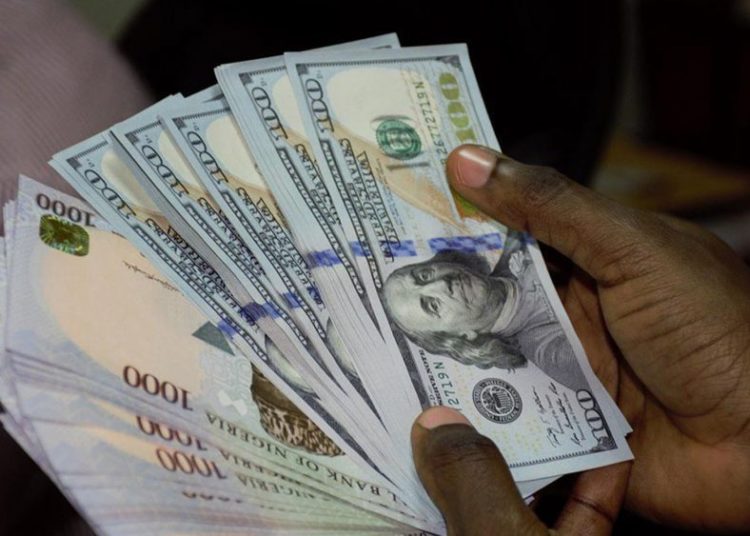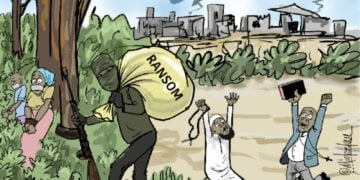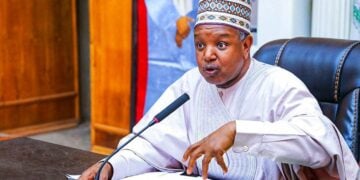The value of the naira reached an all time low yesterday as activity of speculator and scarcity of the dollar drove the value down to between N690 and N700 to the dollar at the parallel market depending on the area of the country.
This as the Senate, yesterday summoned the governor of the Central Bank of Nigeria, Godwin Emefiele, over the free fall of Nigeria’s currency, Naira.
LEADERSHIP findings showed that while the naira sold at N690 in Ikeja area of Lagos, it sold at N700 in Lagos Island and N710 in Abuja. Currency traders attributed the declining value of the naira to scarcity of the dollar and increased demand by customers.
Jubril, a currency trader in Alade area of Lagos told LEADERSHIP that the downturn of the economy is being reflected in the foreign exchange market as there was no dollar to sell. “Dollar is very scarce right now and we do not even have any to sell. Even though it is selling at N690 this evening, (Wednesday July 27, 2022), it will surely go above N700 before the end of this week at this rate of scarcity.” He said.
Professor of Capital Market at the Nasarawa State University Keffi, Uche Uwaleke had noted that the second half of the year will be rife with volatility in the forex market with the naira losing value due in part to exit of foreign investors as well as increased demand for forex by Politicians and also rising yields in the fixed income market.
On his part, Head of Consulting at Agusto Consulting, Jimi Ogbobine said “the recent jump we are seeing is basically a result of a supply crisis in the forex market. So the foundation of all of these is demand versus supply and when demand outweighs supply you will see this kind of currency depreciation.
“If the central bank was able to meet forex demand, then we will not see this kind of price distortion.”
ria is not able to meet forex supply and on the other end we are trying to restrict and constrict demand which means that quite a number of legitimate requests for forex are now being diverted to the parallel market.
Senate Summons CBN Gov Over Naira Depreciation
“So, while the official market seems relatively calm, the reality of the supply shortage is playing out in the parallel market where more legitimate request for forex is being diverted to because the official market is not able to demand.”
Meanwhile, the Senate wants the CBN governor to educate and inform the senators on the reasons for the rapid depreciation of the value of the naira.
It also mandated the Senate Committee on Banking, Insurance and Other Financial Institutions headed by Uba Sani to assess the impact of CBN intervention funds meant to support critical sectors of the economy.
The resolutions were reached by lawmakers after the upper chamber considered a motion sponsored by Senator Olubunmi Adetunmbi (APC – Ekiti North).
The motion was entitled, “State of CBN Intervention Funds and Free Fall Of Naira.”
Coming under Order 41 and 51 of the Senate Standing Order, as amended, Adetunmbi bemoaned Nigeria’s economic reality amid an urgent call for “extraordinary measures”.
He noted that the CBN through its numerous multi-sectoral intervention funds, provided special funds to support critical sectors of the economy.
He explained that in view of such interventions, it had become necessary to assess the state of implementation and effectiveness of the funds deployed for the purpose.
The lawmaker, recalled that the CBN in 2021, placed an indefinite halt on forex bidding by Bureau de Change operators (BDCS) and importers over allegations of abuse and mismanagement.
He observed that the halt by the CBN resulted in a spike of the exchange rate.
According to Adetunmbi, “the two instruments of Personal Travel Allowance (PTA) and Business Travel Allowance (BTA) could only serve less than 20 per cent of the total forex demand by travelers and businesses.”
He expressed worry that the import and export window meant to serve the forex needs of business giants, “has become a rare opportunity that only a privileged few can access.”
“These and a number of others have contributed to the excessive scarcity of forex in Nigeria today”, he added.
He noted that as at the 26th of July 2022 (yesterday), the exchange rate in the autonomous segment (BDCS) of the foreign exchange market is N670 to 1 United States Dollar and projected to end at N1000 by end of the year based on the current rate of depreciation.
He, therefore, advised the Central Bank to take new measures to curb forex scarcity and address the sliding rate of Naira exchange.
In his contribution, Senator Sani Musa (APC – Niger East), faulted the Central Bank’s decision to halt foreign exchange biddings, thereby cutting off the parallel market – Bureau de change operators.
According to him, the attempt by the CBN to control the value of the naira with the continuous exclusion of BDCs would only lead to its further depreciation.
He, therefore, advised the apex bank to rather ensure the regulation and monitoring of the parallel market.
“What CBN used to do was to give out $10,000 (USD) to each of these BDCs with a clear directive for it not to be sold above N470 as against the $419 exchange rate. It worked.
“But today, nobody is determining where the rate is going and I can assure you we can’t have that solution because we are only importing”, he said.
On his part, Senator representing Katsina North District, Senator Ahmad Babba-Kaita, said one way to improve the value of the naira was to encourage foreign investments to attract inflow of other currencies into Nigeria.
“The only way we can access the dollar will be determined by other economies and not ours”, he noted.
He, however, attributed the lack of foreign investments into Nigeria on the poor security situation caused by banditry, terrorism and other criminal activities.
The Senate, in its resolutions, called on the CBN to urgently intervene to stop the rapid decline in the value of the Naira vis-à-vis the Dollar and other international currencies.
It also mandated the Senate Committee on Banking, Insurance and Other Financial Institutions to conduct an assessment of CBN intervention funds and the declining value of Naira to come up with sustainable solutions.
The Senate, at the end of Wednesday’s proceedings, adjourned plenary till September 20th, 2022, for its annual recess.





